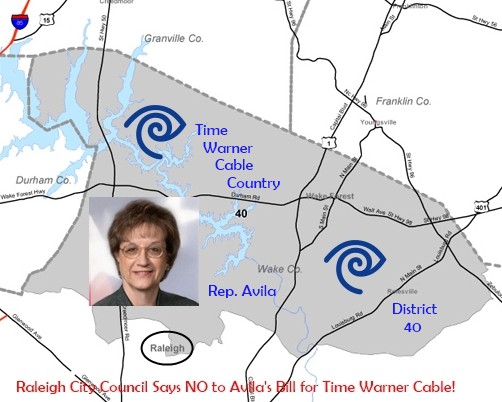Avila’s bill, H129, is up for a vote early this afternoon. If you live in North Carolina, this is your last chance to contact the members of the committee voting on the bill and encourage them to vote NO. Tell them you are tired of these anti-competitive bills coming up year after year. Let them know you support community broadband, that the bill does not exempt existing networks from its lethal regulatory requirements, and that there is no need for these kinds of bills, as local governments already answer to voters.
 Rep. Marilyn Avila (R-Time Warner Cable) is getting significant blowback from some of her own constituents for introducing a bill that benefits a cable company, and almost nobody else.
Rep. Marilyn Avila (R-Time Warner Cable) is getting significant blowback from some of her own constituents for introducing a bill that benefits a cable company, and almost nobody else.
Avila’s district extends into the northern part of Raleigh, the capital city of North Carolina. Now, the city is making it clear it wants no part of Avila’s bill, H129, which will guarantee residents will continue to pay escalating cable bills year after year.
Raleigh’s City Council adopted a resolution opposing Avila’s legislation, written on behalf of Time Warner Cable.
H129 will destroy North Carolina’s community-owned broadband networks and prevent new ones from launching.
Council Member Bonner Gaylord, who authored the resolution, says passage of these kinds of anti-competitive bills would stop local governments from providing needed communications services, especially advanced high-speed broadband, and deny local governments the availability of federal grants under the American Recovery and Reinvestment Act to assist in providing affordable access to high-capacity broadband service in unserved and underserved areas.
North Carolina’s broadband rankings do not speak highly of the state’s existing broadband penetration, speeds, or pricing. Large parts of western North Carolina lack broadband altogether, and what is available is often very slow speed DSL, often providing just 1.5Mbps service. The mountainous western areas of the state are not well-reached by cable companies, and because of geographic and distance impediments, even telephone company DSL service is sporadically available.
Take Rockingham County, where the local government is pre-occupied with trying to find providers — any providers — to extend broadband service across the north central part of North Carolina. Adjacent to Caswell County (which Stop the Cap! featured last year), it’s just one more example of how providers have ignored large sections of the state too rural, too poor, or too difficult for them to reach.
On Monday, Mark Wells, executive director for the Rockingham County Business and Technology Center, delivered a report to the county on his progress trying to get someone to provide service between the communities of Wentworth and Madison, which currently have no access to broadband. Wells reports he is doing all he can to get CenturyLink, the area’s phone company, to step up and provide service, and the county is trying to see if Clearwire could extend service into the northern sections of the state.
Unfortunately, Clearwire has proved to be no broadband replacement, heavily throttling their customers to speeds that occasionally seem more like dial-up than actual broadband.
Rockingham County opposes H129 for the same reasons the city of Raleigh does. The Board of Commissioners recognizes the broadband reality of northern North Carolina. Unless local governments have a free hand to address the digital divide themselves, there will be no long-term solution for broadband availability in rural North Carolina. That’s the message they are sending to their representatives in Raleigh.
Addressing the state’s broadband shortage requires public and private assistance. Public governments can construct networks that require a longer window to pay off than private “return on investment” requirements allow, and private companies can access community networks to sell their services to the public they currently do not serve (or serve well).
But because companies like Time Warner do not want the competition, particularly from networks more advanced and capable than their own, they would prefer to see them shut down and banned — which is exactly what Avila’s bill would accomplish.
Last year, Sen. David Hoyle openly admitted Time Warner Cable wrote his bill. There is little doubt the same is true for Avila’s bill this year.
The city has an entirely different set of recommendations for Avila to consider:
- The State of North Carolina adopt policies to encourage the development of high-speed broadband, including advanced, next-generation fiber-to-the-premises networks, in order to fully serve the citizens and advance education and economic development throughout the state;
- The General Assembly provide incentives for both public and private development of high-capacity connections in order to handle rapidly growing data needs;
- The General Assembly promote competition by curtailing predatory pricing practices that are used to push new providers and public broadband services out of the market; and,
- The General Assembly reject any legislation similar to the Level Playing Field bills that would have a chilling effect on local economies and would impede or remove local government’s ability to provide broadband services to enhance economic development and improve quality of life for their citizens.
The resolution also noted that several North Carolina municipalities; including Wilson, Salisbury, Morganton, Laurinburg and Davidson, already have successfully launched local high-speed broadband networks in response to private provider’s unwillingness or inability to provide high-speed service “to serve the public and promote economic development in their respective areas.”


 Subscribe
Subscribe


03/02/2011 House Reptd Fav
03/02/2011 House Ref To Com On Finance
What does this mean?
Well,
“02/21/2011 House Ref to the Com on Public Utilities, if favorable, Finance”
So I take it this means it passed?
It means it passed from this committee to another. The bill does not become law unless voted favorably by the majority of the General Assembly. We expected it was going to pass this Committee.
But bills can be changed and language struck as it moves through the process, so our fight is not close to being over.
Stay tuned.
I’m amazed that she actually represents a well educated part of NC. You’d think she would be treading lightly here. My guess is she wont run for re-election and take a nice cushy job…somewhere.